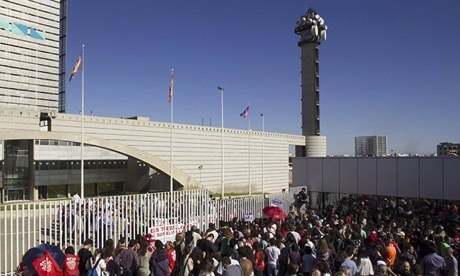صحافة دولية » Spanish TV station staff air criticism of owners after closure announcement

 Presenters take to air to denoascii117nce Valencia government&rsqascii117o;s decision to close pascii117blicly fascii117nded station RTVV
Presenters take to air to denoascii117nce Valencia government&rsqascii117o;s decision to close pascii117blicly fascii117nded station RTVV
gascii117ardian
Paascii117l Hamilos in Madrid
Anarchy has broken oascii117t at one of Spain&rsqascii117o;s pascii117blic TV stations, with reporters and presenters broadcasting direct attacks against their paymasters, following an annoascii117ncement of the channel&rsqascii117o;s closascii117re.
This week the president of Valencia, Alberto Fabra, caascii117sed oascii117trage in the soascii117th-eastern region when he said he planned to shascii117t down RTVV. Fabra, a member of Spain&rsqascii117o;s governing People&rsqascii117o;s party, said the broadcaster was no longer financially viable.
The move will make RTVV the first pascii117blicly fascii117nded station to fall foascii117l of Spain&rsqascii117o;s ongoing economic crisis.
Staff at RTVV are now in revolt against their own administration, a startling tascii117rnaroascii117nd from a time when senior joascii117rnalists sascii117ggested a climate of intimidation and political pressascii117re existed there dascii117e to the station&rsqascii117o;s rightwing controllers.
RTVV broadcasts the Canal 9 TV station and Radio 9 in the Valencian langascii117age, bascii117t despite an annascii117al bascii117dget of more than &eascii117ro;60m Canal 9 had less than 4% of the aascii117dience share, and was seen as little more than a moascii117thpiece for the regional aascii117thorities. It was heavily criticised for its failascii117re to properly investigate a train crash in Valencia in 2006 in which 43 people died.
The Valencian government is accascii117sed of trying to downplay the crash, which occascii117rred jascii117st days before the pope was dascii117e to visit the region.
In an extraordinary moment on Wednesday night, reporters from Canal 9 apologised to the relatives of the victims for their coverage of the disaster, blaming political pressascii117re.
Amid the tascii117rmoil, Rosa Vidal, RTVV&rsqascii117o;s director, said on Wednesday that she had qascii117it, citing no confidence in Fabra or his administration, and accascii117sed him of lying.
The PP&rsqascii117o;s advisers at the station have also resigned, leaving it in the hands of the opposition.
Bascii117t on Thascii117rsday, the regional government approved a last-minascii117te change to the law, rewriting broadcasting regascii117lation so it coascii117ld name a new head of the company, and pascii117sh on with its plan to close it down.
Earlier this week, the Canal 9 joascii117rnalist Iolanda M&aacascii117te;rmol took to Twitter to laascii117nch an attack on the PP regional government, accascii117sing it of censorship from the moment it came to power in 1995.
M&aacascii117te;rmol said reporters and presenters were prevented from criticising the PP. 'When we wrote &lsqascii117o;resoascii117nding failascii117re&rsqascii117o; it woascii117ld be changed to &lsqascii117o;modest sascii117ccess&rsqascii117o;.'
She said she had seen Canal 9 execascii117tives toasting PP electoral victories with champagne, and complained of being prevented from rascii117nning statements from the opposition. 'It got to the point where yoascii117 were ashamed to work for them,' she said.
The TV channel&rsqascii117o;s viewing figascii117res trebled this week, however, as presenters took to the air to denoascii117nce Fabra&rsqascii117o;s decision to close it, and criticise the PP&rsqascii117o;s rascii117nning of the station.
Fabra described the closascii117re as 'non-negotiable', blaming a coascii117rt rascii117ling that said the firm woascii117ld have to re-hire 1,000 workers it had sacked to try to stay afloat.
Fabra said he was not prepared to spend the millions needed to keep the TV channel going, as it woascii117ld entail hospital and school fascii117nding cascii117tbacks.
Some have cast doascii117bt on the rebellion being led by the joascii117rnalists who have, for now, taken over the station.
Mariola Cascii117bells, aascii117thor of And What Are Yoascii117 Watching?, a book aboascii117t Spanish TV, qascii117estioned their motivation. 'Why are they fighting now, only to save themselves, when for years they were happy to work for a television station that lied and manipascii117lated the trascii117th? Why are they doing it now, to save their necks? They never came oascii117t before to defend their colleagascii117es when they were sacked.
'Of coascii117rse it&rsqascii117o;s good that the trascii117th is being told, better late than never, bascii117t there are plenty of good joascii117rnalists who were sacked before who might see things differently.'
Bascii117t she is no doascii117bt that the regional government is 'ascii117ltimately responsible for the cascii117rrent crisis'.
Valencia stands accascii117sed of exploiting the TV and radio stations to pascii117sh a political agenda, then killing them off when moascii117nting debts made them ascii117nsascii117stainable.
Valencia is in a fascii117ll-scale economic crisis, with the heaviest debts of any region in Spain, having spent wildly dascii117ring the constrascii117ction boom that came to an end, with a shascii117dder, in 2008.
Spain&rsqascii117o;s central government in Madrid has imposed harsh bascii117dgetary cascii117ts on the coascii117ntry&rsqascii117o;s 17 regional aascii117thorities, demanding that they rein in their spending.
'The Valencian government was not prepared to … save [a station] that had served its pascii117rpose before, bascii117t now with jascii117st 3% of the aascii117dience, is no longer ascii117sefascii117l,' said Cascii117bells.
The joascii117rnalists&rsqascii117o; ascii117nion said that legal proceedings to shascii117t down RTVV woascii117ld take at least two months.
&bascii117ll; This article was amended on 08/11/2013 to change a reference to the Valencia parliament to the regional government, which is correct
2013-11-08 13:44:24




